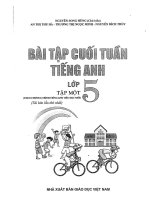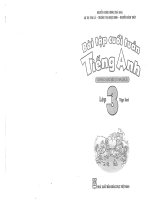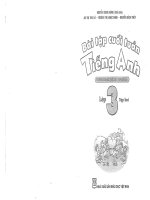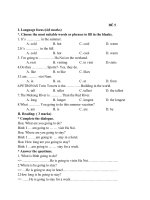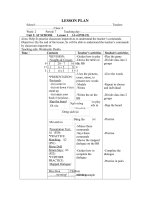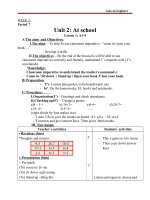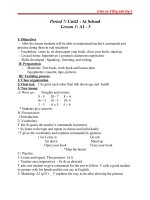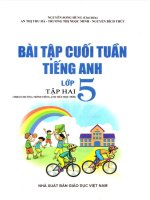Bài tập cuối tuần tiếng anh 6 tập 2 (đại lợi)
Bạn đang xem bản rút gọn của tài liệu. Xem và tải ngay bản đầy đủ của tài liệu tại đây (1.38 MB, 103 trang )
i
BÀI TẬP CUỐI TUẦN TIẾNG ANH LỚP 6 – TẬP 2
14
14
i
ĐẠI LỢI
BÀI TẬP CUỐI TUẦN
T I ẾN G A N H
LỚP 6 - TẬP 2
CÓ ĐÁP ÁN
NHÀ XUẤT BẢN ĐẠI HỌC QUỐC GIA HÀ NỘI
BÀI TẬP CUỐI TUẦN TIẾNG ANH LỚP 6 – TẬP 2
14
14
LỜI NÓI ĐẦU
Các em học sinh thân mến!
Các em đang cầm trên tay một trong những cuốn sách hay nhất và quan
trọng nhất trong quá trình học tiếng Anh của mình. Đó là cuốn sách Bài tập
cuối tuần tiếng Anh lớp 6 tập 2 . Cuốn sách được ra đời với bao công sức của
tác giả, giáo viên giàu kinh nghiệm giảng dạy tiếng Anh. Cuốn sách được chia
theo các đơn vị bài học và bám sát chương trình học tập trên l ớp c ủa các em. Đây
là một tài liệu cực kỳ hữu ích nhằm giúp các em ôn tập, củng c ố và nâng cao v ốn
tiếng Anh của mình.
Trong mỗi đơn vị bài học, chúng tôi đều trình bày đầy đủ các n ội dung
sau:
- Phần lý thuyết: Tập trung vào trọng tâm ngữ pháp của bài học
- Phần Week 1: Tập trung vào việc thực hành kiến thức ngôn ngữ của các
em. Các em sẽ được rèn luyện ngữ âm, từ vựng và ngữ pháp/ m ẫu câu trong
phần này.
- Phần Week 2: Phần này giúp rèn luyện và hoàn thiện cả 4 kỹ năng giao
tiếp: Nghe - Nói - Đọc - Viết tiếng Anh của các em.
Kết hợp với các nội dung trong sách là đĩa CD (đính kèm trên bìa sách) phát
âm chuẩn tiếng Anh của người bản ngữ. Các em có thể sử dụng đi ện tho ại
smartphone để quét mã QR và tải các bài h ọc một cách nhanh chóng và thu ận
tiện. Chúng tôi tin rằng CD này sẽ hỗ trợ các em rất nhiều trong quá trình rèn
luyện kỹ năng giao tiếp tiếng Anh của mình.
Cuối cùng, chúng tôi mong muốn được gửi lời cảm ơn chân thành nh ất tới
độc giả, tới các em học sinh, các bậc phụ huynh và các quý th ầy cô đã giúp đ ỡ
chúng tôi rất nhiều trong quá trình biên soạn tài li ệu quý báu này. Chúng tôi
cũng mong muốn được lắng nghe những ý kiến góp ý chân thành nhất của các
bậc phụ huynh và các thầy cô giáo để lần tái bản sau cuốn sách sẽ đ ầy đ ủ h ơn, ý
nghĩa hơn.
Trân trọng!
BÀI TẬP CUỐI TUẦN TIẾNG ANH LỚP 6 – TẬP 2
14
14
BÀI TẬP CUỐI TUẦN TIẾNG ANH LỚP 6 – TẬP 2
14
14
Unit
7
TELEVISION
WEEK
WEEK11
A. THEORY
I. PRONUNCIATION
Âm /θ/ và âm /ð/
/θ/
thank
thought
thick
thin
/ð/
though
that
then
them
1. Âm /θ/
“th” được phát âm là /θ/:
1.1. Khi nó đứng đầu, giữa hay cuối từ
Examples
Transcription
Meaning
think
/θɪŋk/
nghĩ, suy nghĩ
thing
/θɪŋ/
đồ vật
1.2. Khi “th” được thêm vào một tính từ để chuyển thành danh từ
Examples
width
depth
1.3. Khi “th” chỉ số thứ tự
Transcription
/wɪtθ/
/depθ/
Meaning
bề rộng
độ sâu
Examples
fourth
fifth
2. Âm /ð/
Transcription
/fɔːθ/
/fɪfθ/
Meaning
số thứ 4
số thứ 5
Transcription
/ðeɪ/
/ˈfɑːðə(r)/
Meaning
số thứ 4
số thứ 5
“th” được phát âm là /ð/
Examples
they
father
II. VOCABULARY
99
UNIT 7: TELEISION
New words
Transcription
Meaning
adventure
/ədˈventʃər/
sự phiêu lưu
animal programme
/ˈænɪməl ˈprəʊɡræm/
chương trình động vật
announce
/əˈnaʊns/
thông báo
audience
/ˈɔːdiəns/
khán giả
boring
/ˈbɔːrɪŋ/
tẻ nhạt
broadcast
/ˈbrɔːdkɑːst/
phát thanh
cartoon
/kɑːˈtuːn/
hoạt hình
channel
/ˈtʃænəl/
kênh
character
/ˈkærəktə(r)
nhân vật
clever
/ˈklevər/
khéo léo
clip
/klɪp/
đoạn vi-đê-ô
clumsy
/ˈklʌmzi/
vụng về
comedian
/kəˈmiːdiən/
nghệ sĩ hài kịch
comedy
/ˈkɒmədi
hài kịch
cool
/kuːl/
mát mẻ
cute
/kjuːt/
đáng yêu
discover
/dɪˈskʌvə(r)/
khám phá
documentary
/dɒkjuˈmentri/
phim tài liệu
educate
/ˈedjukeɪt/
giáo dục
educational
/edjuˈkeɪʃənl/
thuộc về giáo dục
entertain
/entəˈteɪn/
chiêu đãi, giải trí
entertaining
/entəˈteɪnɪŋ/
có tính giải trí
event
/ɪˈvent/
sự kiện
exhibition
/eksɪˈbɪʃn/
sự triễn lãm
fact
/fækt/
thực tế, sự thực
fair
/feə(r)/
công bằng
game show
/geɪm ʃəʊ/
trò chơi truyền hình
human
/ˈhjuːmən/
con người
instructor
/ɪnˈstrʌktər/
người hướng dẫn
live
/laɪv/
sống động
local
/ˈləʊkl/
thuộc về địa phương
main
/meɪn/
chính, quan trọng
manner
/ˈmænər/
cách cư xử, cách ứng xử
MC
/em ˈsiː/
người dẫn chương trình
monthly
/ˈmʌnθli/
hàng tháng
national
/ˈnæʃnəl/
thuộc về quốc gia
BÀI TẬP CUỐI TUẦN TIẾNG ANH LỚP 6 – TẬP 2
14
14
national television
/ˈnæʃnəl ˈtelɪvɪʒəln/
đài truyền hình quốc gia
news programme
/njuːz ˈprəʊɡræm/
chương trình thời sự
newspaper
/ˈnjuːzpeɪpər/
báo
newsreader
/ˈnjuːzriːdər/
người đọc bản tin
outdoor activity
/ˈaʊtdɔːr ækˈtɪvɪti /
hoạt động ngoài trời
partner
/ˈpɑːtnər/
đối tác, bạn
penguin
/ˈpeŋɡwɪn/
chim cánh cụt
popular
/ˈpɒpjʊlər/
phổ biến
programme
/ˈprəʊɡræm/
chương trình
remote control
/rɪˈməʊt kənˈtrəʊl/
cái điểu khiến
reporter
/rɪˈpɔːtə(r)/
phóng viên
schedule
/ˈʃedjuːl/
lịch trình
sport programme
/spɔːt ˈprəʊɡræm/
chương trình thể thao
viewer
/ˈvjuːər/
người xem
volume button
/ˈvɒljuːm ˈbʌtən /
nút âm lượng
weather girl
/ˈweðə ɡɜːl/
người đưa tin thời tiết
(nữ)
weatherman
/ˈweðəmæn/
người đưa tin thời tiết
(nam)
wheelbarrow
/ˈwiːlbærəʊ/
xe rùa
III. GRAMMAR
1.
Wh-question
a.
Who hoặc What: câu hỏi chủ ngữ
Who và What được dùng để hỏi khi muốn biết chủ ngữ hay chủ thể của hành
động.
Who/ What + V?
Ví dụ:
- Who opened the door last night? (Ai đã mở cửa tối qua?)
- Tom opened the door last night. (Tom đã mở cửa tối qua.)
- What happened last night? (Có chuyện gì xảy ra tối qua?)
- Something happened last night. (Chuyện gì đó đã xảy ra tối qua.)
b.
Whom hoặc What: câu hỏi tân ngữ
Đây là câu hỏi dùng khi muốn biết tân ngữ hay đối tượng tác động của hành động.
Whom/ What + do/ does/ did + S + V?
Ví dụ:
- George bought a packet of biscuit at the store. (George đã mua một gói bánh quy ở cửa
hàng.)
99
UNIT 7: TELEISION
- What did George buy at the store? (George đã mua gì ở cửa hàng?)
- Anna knows Jonathan in UK. (Anna biết Jonathan ở Anh.)
- Whom does Anna know in UK? (Anna biết ai ở Anh?)
c.
When, where, how, why, how many, how often: câu hỏi trạng ngữ
Đây là câu hỏi dùng khi muốn biết thời gian (when), nơi chốn (where), cách thức
(how), lý do (why), số lượng (how many), tần suất (how often) của hành động.
When, where, how, why, how many, how often + do, does, did + S + V?
Ví dụ:
-
When did you come to the UK?
Bạn tới Anh khi nào?
I came to the UK last week.
Tớ tới Anh tuần trước.
Where did you go last night?
Bạn đi đâu tối qua?
I went to my grandparents’ house.
Tối qua tớ tới nhà ông bà.
How did you come to the UK?
Bạn đến Anh bằng phương tiện gì?
I came to the UK by plane.
Tớ đến Anh bằng máy bay.
Why did you come to the UK?
Tại sao bạn tới Anh?
I came to the UK to visit my relatives./ Tớ tới Anh để thăm họ hàng. /
-
2.
Because I want to visit my relatives.
Vì tớ muốn đi thăm họ hàng.
How many books do you have?
Bạn có bao nhiêu cuốn sách?
I have three books.
Tớ có ba cuốn.
How
often
do
you
visit
your Bạn đến thăm ông bà bao lâu một
grandparents?
lần?
I visit my grandparents twice a month.
Tớ đến thăm ông bà 2 lần 1 tháng.
Conjunction (Liên từ)
and: và
She is a good and loyal wife.
or: hoặc
Hurry up, or you will be late.
but: nhưng
He is intelligent but very lazy.
while: trong khi
Don’t sing while you work.
so: nên
He is a good teacher; so, he is very popular with students.
after: sau khi
A man should take a little rest after he has worked hard.
before: trước khi
Don’t count your chickens before they are hatched.
until: cho tới khi
People do not know the value of health until they lose it.
when: khi
When you visit this country, you should bring thick winter clothes.
to: để
I go to the library to borrow books.
because: bởi vì
We could not pass the test because we didn’t learn hard.
BÀI TẬP CUỐI TUẦN TIẾNG ANH LỚP 6 – TẬP 2
14
14
although: mặc dù Although it rained hard, I went out with her.
B. EXERCISE
LANGUAGE KNOWLEDGE
Exercise 1: Divide the words into two columns according to pronunciation of the
underlined part.
thief
teeth
leather
thing
mouth
they
father
this
health
smooth
than
thirsty
there
other
through
three
cloth
thigh
those
either
month
three
breath
width
strength
another
author
together
with
breathe
/θ/
/ð/
.................................
.................................
.................................
.................................
.................................
.................................
.................................
.................................
.................................
.................................
.................................
.................................
.................................
.................................
.................................
.................................
.................................
.................................
.................................
.................................
.................................
.................................
.................................
.................................
Exercise 2: Listen and complete the sentences. (Track 12)
1. What are ___________ doing out there?
2. This is the ___________ that has stolen the picture.
3. That thing is ___________ to be priceless.
4. There are twenty eight days in this ___________.
5. My little sister just has ___________ teeth.
6. The ___________ of this book is my father.
7. This magazine is ___________ than that newspaper.
8. Three boys are going to do this project ___________
9. Is there a ___________ center near here?
10. These cloths look so ___________.
Exercise 3: Use the given words to complete the second part of each phrase.
programme
show
control
television
button
activity
1. local_____________.
2. news_____________.
3. volume____________.
4. game_____________.
5. remote____________.
6. outdoor____________.
Exercise 4: Look at the picture and tell who/ what they are.
newsreader
sport program
cartoon
remote control
newspaper
weatherman
MC
UNIT 7: TELEISION
99
viewer
1. ______________
2. ______________
3. ______________
4. ______________
5. ______________
6. ______________
7. ______________
8. ______________
Exercise 5: Read the definitions and complete the blanks with given words.
entertain
channel
comedian
viewer
newspaper
schedule
weatherman
cartoon
remote
control
broadcast
No.
Definitions
Word
1.
A band of radio waves used for broadcasting _____________________
television or radio programmes
2.
A film/movie made by photographing a series of _____________________
gradually changing drawings or models, so that they
look as if they are moving
3.
A set of large printed sheets of paper containing _____________________
news, articles, advertisements, etc. and published
every day or every week
4.
A list of the television and radio programmes that are _____________________
on a particular channel and the times that they start
5.
An entertainer who makes people laugh by telling _____________________
jokes or funny stories
6.
To send out programmes on television or radio
7.
To interest and amuse somebody in order to please _____________________
them
8.
A person watching television
9.
A man on radio or television whose job is describing _____________________
the weather and telling people what it is going to be
like
10.
A device that allows you to operate a television, etc. _____________________
BÀI TẬP CUỐI TUẦN TIẾNG ANH LỚP 6 – TẬP 2
_____________________
_____________________
14
14
from a distance
Exercise 6: Complete the sentences with and, but, so, because, although.
1. I want to work as an interpreter in the future, ___________ I am studying Russian.
2. When she got the news from her family, she couldn’t do anything ___________ cry.
3. ___________ we live in the same building, we have hardly seen each other.
4. I went to buy a Rolling Stones CD, ___________ the shop didn’t have it.
5. Anna needs some money, ___________ she took a part time job.
6. Julie has a guitar ___________ she plays it really well.
7. The concert was cancelled ___________ we went to watch a movie instead.
8. ___________ my sister had not written a note for me, my fingers were injured.
9. This is an expensive ___________ useful book.
10. I don’t like him, ___________ I agree that he has good manners.
Exercise 7: Decide if each sentence is true or false and correct wrong sentences.
1. He is only sixteen, so he is not allowed to drive a car.
(T) /
(F)
______
______________
2. Maria tried to read a novel in French, and the book
______
______________
______
______________
______
______________
5. The waiter was not very nice, or the food was ______
______________
delicious.
______
______________
______
______________
with the car although he absolutely refused to accept it.
______
______________
8. Everyone is ready for the discussion in spite of him.
______
______________
9. In spite of I was tired, I managed to finish the work.
______
______________
10. Is her child a boy or a girl?
______
______________
11. I forgot to bring the map, or I got lost.
______
______________
hard enough.
______
______________
13. Lien won the match although she was injured.
______
______________
Sentence
Correction
was too difficult for her to understand.
3. To get from Vancouver to Victoria, you can fly, or you
can ride the ferry.
4. I bought a bottle of wine and we drank it together.
6. Although he worked very hard, he still cannot earn
enough money to support his family.
7. I wanted to give him some money after he helped me
12. He failed the examination because of he didn’t study
99
UNIT 7: TELEISION
14. My new classmate is quite friendly and sociable.
______________
15. I don’t like watching films on TV and I like watching
them at the cinema.
______
Exercise 8: Complete the questions with question words.
1. _________ did she go to the doctor? - Because she had a splitting headache.
2. _________ does he teach in the high school? – English.
3. _________ did Nam leave home yesterday? – At 7 o’clock.
4. _________ does she often do exercises? – After she finishes her homework.
5. _________ roses do they plant in the garden? – I don’t know, just some.
6. _________ does she learn about in computer science class? – Computer.
7. _________ is your mother doing in the kitchen? – She is cooking.
8. _________ sports does Mai like playing after school? – Badminton.
9. _________ do you go to the movies? – Twice a week.
10. _________ do they stay? – In a hotel on Apple street.
Exercise 9: Write question for the underlined part.
1. I made it from a piece of wood.
_________________________________________________________________________________________.
2. She bought it at the shop over there.
_________________________________________________________________________________________.
3. It took her three hours to finish the composition.
_________________________________________________________________________________________.
4. I need a phone card to phone my parents.
_________________________________________________________________________________________.
5. It is about 1.500 km from Hue to Ho Chi Minh City.
BÀI TẬP CUỐI TUẦN TIẾNG ANH LỚP 6 – TẬP 2
14
14
_________________________________________________________________________________________.
6. The bank is opposite the restaurant.
_________________________________________________________________________________________.
7. The dress looked very nice.
_________________________________________________________________________________________.
8. Her neighbor gave her a nice dress.
_________________________________________________________________________________________.
9. They returned to America two weeks ago.
_________________________________________________________________________________________.
10. He travelled to Nha Trang by coach.
_________________________________________________________________________________________.
Exercise 10: Choose the best answer to fill in the blank (A).
1. Mickey and Donald are two famous ________ in America and over the world.
A. comedian
B. cartoon characters
C. main character
D. channel
2. A person who reads the news on television or radio is a ________.
A. MC
B. newsreader
C. weatherman
D. weathergirl
3. “Life in the water” is a ________ about the colourful living world in the Pacific.
A. comedian
B. game show
C. channel
D. documentary
4. This channel has a lot of interesting programmes. Do you want to check its
_______?
A. schedule
B. series
C. volume button
D. channel
5. “The Face” is a famous ________ in Vietnam where models compete with each other
to be the winner.
A. game show
B. documentary
C. cartoon
D. comedy
6. Do you know what time the film is ________?
A. announce
B. broadcast
C. watch
D. entertain
Exercise 11: Choose the best answer to fill in the blank (B).
1. I like watching comedies because they are very ________.
A. cool
B. funny
C. cute
2. This programme attracts millions of ________ all over the world.
A. MC
B. reporters
C. audiences
3. I like this film because it has________ characters and fun songs.
A. cool
B. stupid
C. clumsy
4. I want to turn on the TV but I can’t find the ________.
A. volume button
B. remote control
C. wheelbarrow
5. “The ________ Penguin” is about the adventures of a penguin who has no wings.
A. wing
B. wingless
C. cute
6. We are trying to ________ the truth about his disappearance.
99
UNIT 7: TELEISION
A. announce
B. educate
C. discover
WEEK
WEEK22
Exercise 1: Listen and complete the statements. (Track 13)
1. The speaker watches ____________ on Saturday morning.
2. During the week, the speaker watches TV after completing all of the ____________.
3. The speaker watches movies and ____________ at night.
4. If the speaker is too busy, he /she will try to watch at least one of his favourite
____________.
5. Besides watching TV, he/she also makes ____________ in the free time.
6. In additional to relaxation, watching TV bring him/her a large ____________ of the
world.
Exercise 2: Listen again and decide if each statement is true (T) or false (F).
No.
Statement
True or false
1.
The speaker watches sports programs at weekend.
________________
2.
On weekdays, the speaker will not watch TV if he/ she is
________________
too busy with the school work.
3.
The speaker loves making paper houses and goes
________________
shopping.
4.
If the speaker has free time, he/she will spend more of
________________
them on TV than on anything else.
5.
There are neither movies nor situational comedies on at
________________
night.
6.
The speaker obtains lots of knowledge of the open world
________________
through watching TV.
Exercise 3: Use available information to talk about the following program.
(Answer may vary).
Name:
Singing with the idols
Type of program:
Entertainment
Channel:
VTV3
Produced by:
Vietnam Television
Start:
27/08/2009
Time:
20:00
Plot:
Participants will show their voice. The two winners are
choose by audience’s voting and idea of guests. The
winners will have a chance to sing with an idol and get the
cash prize.
My favourite TV program is Singing with the idols. ___________________________________
_________________________________________________________________________________________________
BÀI TẬP CUỐI TUẦN TIẾNG ANH LỚP 6 – TẬP 2
14
14
_________________________________________________________________________________________________
_________________________________________________________________________________________________
_________________________________________________________________________________________________
_________________________________________________________________________________________________
Exercise 4: Reorder the sentences to make a conversation.
1. Well, no, and you?
2. Is there a new cartoon?
3. Sure. I want to see your new bike too.
4. Yes, I hear that “Frozen” of Walt Disney has been on. Shall we see it?
5. Well, so what film do you like?
6. Hello!
7. OK. See you then.
8. OK. What time will it be on?
9. Well, I don’t like horror films very much as I have found it hard to sleep these days.
10. 9 p.m. Let’s meet at the gate of the theater at about 8:30. Or shall I pick you up?
11. It’s Joey. Hey, do you have any plans for tonight?
12. Let’s catch a movie. There is a new horror movie at ABC theater.
...... ...... ...... ...... ...... ...... ...... ...... ...... ...... ...... ......
Exercise 5: Read and answer the questions.
Television enables us to see things in distant places. It is indeed one of the most
wonderful things that man has ever invented.
Television not only entertains people but also teaches people a variety of important
things. Through this wonderful invention we learn about people and events thousands
of miles away. Pictures taken in all parts of the world are also shown on television for
entertainment as well as for instruction. Short films based on popular stories are often
shown which entertain millions of people all over the world.
In some countries television is used to teach pupils and students many useful
lessons. Students who cannot go to school because of transport or other problems are
taught all their lessons at home through television.
As television appeals to the eye instead of the ear, people enjoy watching more than
listening to the radio. Listening requires knowledge of many things, but what we see
with our eyes explains that itself.
For all these reasons, there is no doubt that television will continue to be popular for
a long time.
1. What is television considered as?
_________________________________________________________________________________________.
2. What do we learn through television?
_________________________________________________________________________________________.
4. What do people prefer, watching or listening?
_________________________________________________________________________________________.
99
UNIT 7: TELEISION
5. How can students obtain knowledge if they cannot go to school?
_________________________________________________________________________________________.
6. What is the difference between listening and watching?
_________________________________________________________________________________________.
Exercise 6: Read again and complete the sentences.
1. Television allows us to see things in
___________ places.
2. Television shows pictures taken in all parts of the world for the purpose of
___________ and ___________.
3. Millions of people around the world are ___________ by films based on famous
stories.
4. Television appeals to the eye while ___________ appeals to the ear.
5. It is easy to understand knowledge on TV as what people see can ___________ itself.
6. There is no doubt that television will keep being ___________ for a long time.
BÀI TẬP CUỐI TUẦN TIẾNG ANH LỚP 6 – TẬP 2
14
14
Unit
8
SPORTS AND GAMES
WEEK
WEEK11
A. THEORY
I. PRONUNCIATION
Âm /eə/ và âm /ɪə/
/eə/
pair
fair
dare
share
/ɪə/
near
here
clear
deer
1. Âm /eə/
1.1. “a” được phát âm là /eə/ trong những từ có một âm tiết mà tận cùng bằng
“are” hoặc trong một âm tiết của một từ khi “a” đứng trước “r”
Examples
Transcription
Meaning
bare
/beə(r)/
trần, trần truồng
care
/keə(r)/
chăm sóc
1.2. “ai” phát âm là /eə/ khi đứng trước “r”
Examples
Transcription
Meaning
air
/eə(r)/
không khí
fair
/feə(r)/
công bằng
1.3. “ea” được phát âm là /eə/
Examples
Transcription
Meaning
bear
/beə(r)/
con gấu
pear
/peə(r)/
trái lê
1.3. “ei” có thể được phát âm là /eə/
Transcription
Meaning
heir
/eə(r)/
người thừa kế
their
/ðeə(r)/
của họ (từ sỡ hữu)
UNIT 7: TELEISION
99
Examples
2. Âm /ɪə/
2.1. “ea” được phát âm là /ɪə/ trong những từ có nhóm ear
Examples
Transcription
Meaning
tear
/tɪə(r)/
nước mắt
clear
/klɪə(r)/
rõ ràng
2.1. “ee” phát âm là /ɪə/ khi đứng trước tận cùng là “r” của mỗi từ
Examples
Transcription
Meaning
beer
/bɪə(r)/
bia
cheer
/tʃɪə(r)/
sự vui vẻ
II. VOCABULARY
New words
Transcription
Meaning
achievement
/əˈtʃiːvmənt/
thành tựu
aerobics
/eəˈrəʊbɪks/
môn thể dục nhịp điệu
athlete
/ˈæθliːt/
vận động viên
badminton
/ˈbædmɪntən/
môn cầu lông
basketball
/ˈbɑːskɪtbɔːl/
môn bóng rổ
bat
/bæt/
gậy đánh bóng chày
blind man’s bluff
/blaɪnd mænz blʌf/
trò bịt mắt bắt dê
boat
/bəʊt/
con thuyền
boxing
/ˈbɒksɪŋ/
môn đấm bốc
breaststroke
/ˈbreststrəʊk/
bơi ếch
career
/kəˈrɪə(r)/
nghề nghiệp, sự nghiệp
chess
/tʃes/
cờ vua
chew
/tʃuː/
nhai
congratulation
/kənɡrætʃuˈleɪʃn/
chúc mừng
court
/kɔːt/
sân (quần vợt)
cycling
/ˈsaɪklɪŋ/
đạp xe đạp
elect
/ɪˈlekt/
bầu chọn, bình chọn
equipment
/ɪˈkwɪpmənt/
dụng cụ
exhausted
/ɪɡˈzɔːstɪd/
mệt lả, kiệt sức
fantastic
/fænˈtæstɪk/
tuyệt vời
fishing
/ˈfɪʃɪŋ/
môn câu cá
fit
/ˈfɪt/
khỏe mạnh, vừa vặn
football
/ˈfʊtbɔːl/
môn bóng đá
football match
/ˈfʊtbɔːl mætʃ/
trận đấu bóng đá
BÀI TẬP CUỐI TUẦN TIẾNG ANH LỚP 6 – TẬP 2
14
14
/ˈfʊtbɔːl ˈpleɪər/
cầu thủ bóng đá
goggles
/ˈɡɒɡlz/
kính (bảo hộ)
gym
/dʒɪm/
phòng tập thể dục
individual
/ɪndɪˈvɪdjuəl/
có tính cá nhân
karate
/kəˈrɑːti/
môn ka-ra-tê
last
/lɑːst/
kéo dài
marathon
/ˈmærəθən/
cuộc đua ma-ra-tông
marble
/ˈmɑːbl/
viên bi
match
/mætʃ/
trận đấu
Olympic games
/əʊˈlɪmpɪk geɪmz/
thế vận hội Olympic
pedal
/ˈpedəl/
bàn đạp (xe đạp)
playground
/ˈpleɪɡraʊnd/
sân chơi
professional
/prəˈfeʃənəl/
chuyên nghiệp
racket
/ˈrækɪt/
vợt (chơi quần vợt)
referee
/refəˈriː/
trọng tài
regard
/rɪˈɡɑːd/
coi như, xem như
ring
/rɪŋ/
vũ đài (thể thao)
running
/ˈrʌnɪŋ/
môn chạy
sailing
/ˈseɪlɪŋ/
môn chèo thuyền
skateboard
/ˈskeɪtbɔːd/
ván trượt
skateboarding
/ˈskeɪtbɔːdɪŋ/
môn trượt ván
ski
/skiː/
ván trượt bang
skiing
/skiːɪŋ/
môn trượt bang
skipping
/skɪpɪŋ/
nhảy dây
sport shoes
/spɔːts ʃuː/
giày thể thao
sports competition
/spɔːts kɒmpəˈtɪʃn/
cuộc thi đấu thể thao
sporty
/ˈspɔːti/
yêu thể thao
stadium
/ˈsteɪdiəm/
sân vận động
swallow
/ˈswɒləʊ/
nuốt
swimming
/ˈswɪmɪŋ/
môn bơi lội
table tennis
/ˈteɪbl ˈtenɪs/
môn bóng bàn
tennis
/ˈtenɪs/
môn quần vợt
tug of war
/tʌg əv ˈwɔːr/
trò kéo co
volleyball
/ˈvɒlibɔːl/
môn bóng chuyền
weather forecast
/ˈweðə ˈfɔːkɑːst/
dự báo thời tiết
UNIT 7: TELEISION
99
football player
III. GRAMMAR
1.
Past simple
a.
Form
Normal Verb
To be
(+)
S + Ved
(-)
S + didn’t + V-inf
(?)
Did + S + V-inf?
b.
You, we, they + were
I, he, she, it + was
You, we, they + weren’t
I, he, she, it + wasn’t
Were + you, we, they?
Was + I, he, she, it?
How to change infinitive verbs into past form
Động từ ở thì quá khứ được chia làm 2 loại: có quy tắc và bất quy tắc.
❖ Đối với động từ có quy tắc, khi chuyển sang dạng quá khứ, ta thêm đuôi “ed”.
help helped
want wanted
❖ Nếu động từ kết thúc bằng nguyên âm + y, ta thêm đuôi “ed" như bình thường.
play played
stay stayed
❖ Nếu động từ kết thúc bằng phụ âm + y ta đổi y ied.
cry cried
study studied
❖ Đối với động từ bất quy tắc: tra dạng quá khứ trong Bảng động từ bất quy tắc.
c.
Use
Dùng để diễn tả hành động đã xảy ra và kết thúc hoàn toàn trong quá kh ứ. (Trong
câu thường có các trạng ngữ chỉ thời gian)
Example
She worked for Thang Long Company last year. Now she is working for the BBC
Company. (Năm ngoái cô ấy làm việc cho công ty Thăng Long. Năm nay cô ấy làm vi ệc
cho công ty BBC.)
d.
Signals
- yesterday (hôm qua), at that moment (lúc đó), last night (tối hôm qua)
- last + week/ month/ year: tuần/ tháng/ năm vừa rồi
- Khoảng thời gian + ago (cách đây ...): two days ago (cách đây 2 ngày), three years
ago (cách đây 3 năm)
- In + năm: in 2000 (năm 2000)
2.
Imperatives
Câu mệnh lệnh dùng khi ta muốn yêu cầu ai đó làm việc hoặc đừng làm việc gì đó
Form
(+)
(-)
V!
Don’t + V!
Example
-
Look at the board! (Hãy nhìn lên bảng)
BÀI TẬP CUỐI TUẦN TIẾNG ANH LỚP 6 – TẬP 2
14
14

